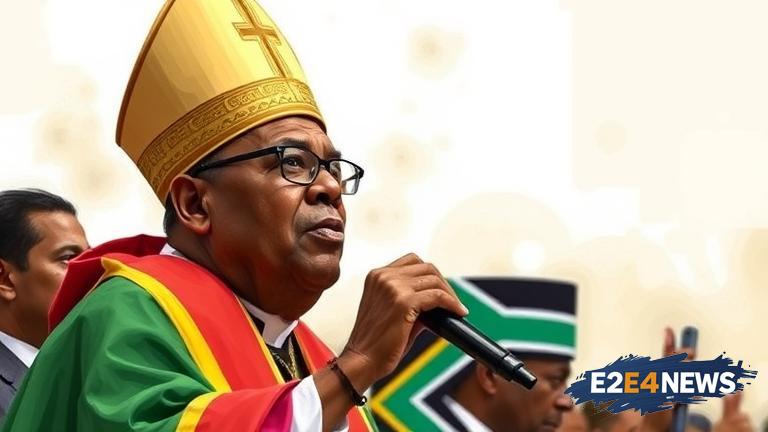In a bold move, Bishop Sipuka of the Southern African Catholic Bishops’ Conference has called on the church to take a leading role in the fight against corruption in South Africa. The bishop’s statement comes at a time when corruption has become a major concern in the country, with many high-profile cases making headlines in recent years. According to Bishop Sipuka, the church has a critical role to play in promoting transparency and accountability in all aspects of society. He emphasized that corruption is a moral issue that affects not only the economy but also the social fabric of the country. The bishop’s comments were made during a recent address to the church, where he urged Catholics to take an active stance against corruption. He also called on the government to take decisive action to address the issue, citing the need for stronger laws and more effective enforcement. Bishop Sipuka’s statement has been welcomed by many, who see the church as a key player in the fight against corruption. The church’s influence extends to all levels of society, and its leadership can help to mobilize public opinion and push for change. The bishop’s call to action is also seen as a reflection of the church’s commitment to social justice and its role in promoting the common good. In recent years, the church has been increasingly vocal on issues of corruption, inequality, and poverty, and has called on the government to take action to address these challenges. The fight against corruption is a complex and ongoing one, and will require the efforts of all sectors of society. The church’s leadership can help to bring people together and promote a sense of shared responsibility for addressing the issue. By taking a strong stance against corruption, the church can also help to promote a culture of transparency and accountability, which is essential for building trust and promoting economic growth. Furthermore, the church’s involvement can help to ensure that the fight against corruption is not just a political issue, but a moral and ethical one. This can help to build a broader coalition of support for anti-corruption efforts and promote a sense of urgency and importance around the issue. In addition to its moral authority, the church also has a significant presence and influence in many communities, which can be leveraged to promote awareness and education about corruption. The church can also provide a platform for victims of corruption to share their stories and seek support, which can help to build a sense of solidarity and promote action. Overall, Bishop Sipuka’s call to action is an important step in the fight against corruption, and reflects the church’s commitment to promoting justice and transparency in all aspects of society. The bishop’s statement has been widely reported in the media, and has sparked a lively debate about the role of the church in addressing corruption. Many have welcomed the bishop’s comments, and see them as a reflection of the church’s growing engagement on social and economic issues. Others have criticized the bishop’s statement, arguing that the church should focus on spiritual matters rather than getting involved in politics. However, the bishop’s comments are seen by many as a necessary intervention, given the scale and impact of corruption in South Africa. The country has been ranked as one of the most corrupt in the world, and corruption is seen as a major obstacle to economic growth and development. The church’s involvement can help to bring a sense of moral urgency to the issue, and promote a sense of shared responsibility for addressing it. By working together, the church, government, and civil society can help to build a more just and equitable society, where corruption is not tolerated and the rule of law is upheld. The fight against corruption will not be easy, but with the church’s leadership and involvement, it is possible to make progress and create a better future for all South Africans.
